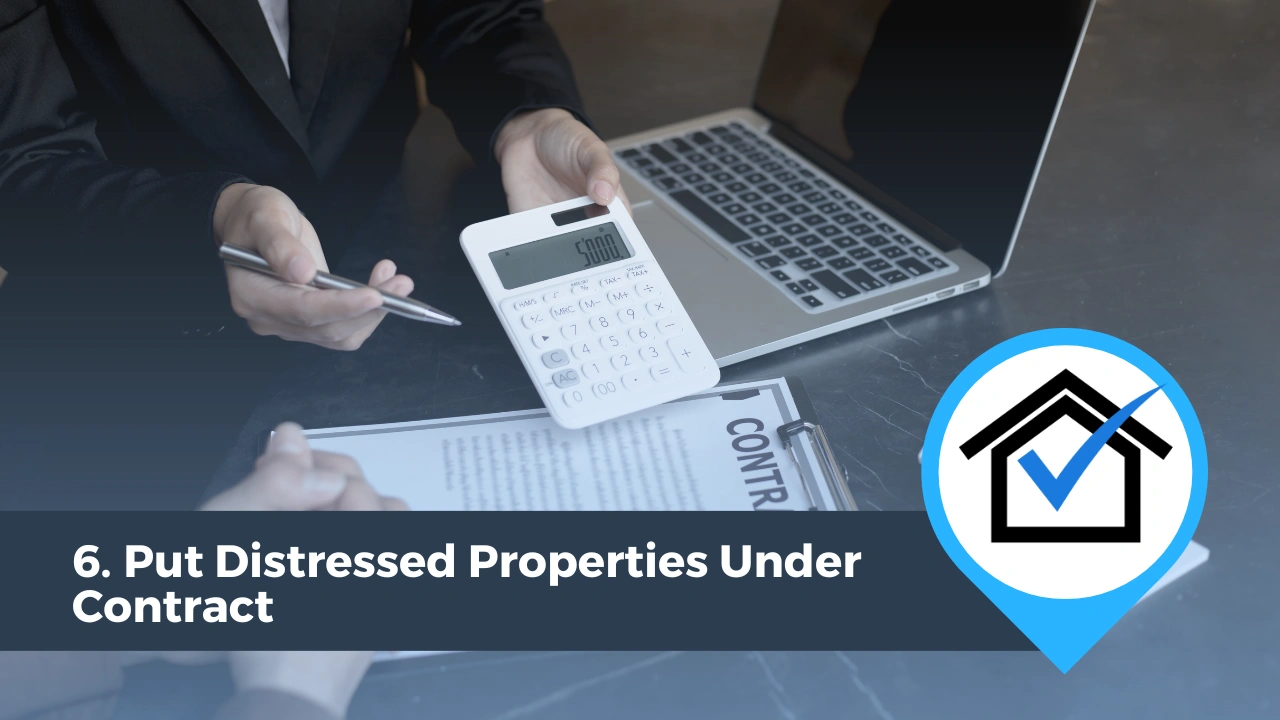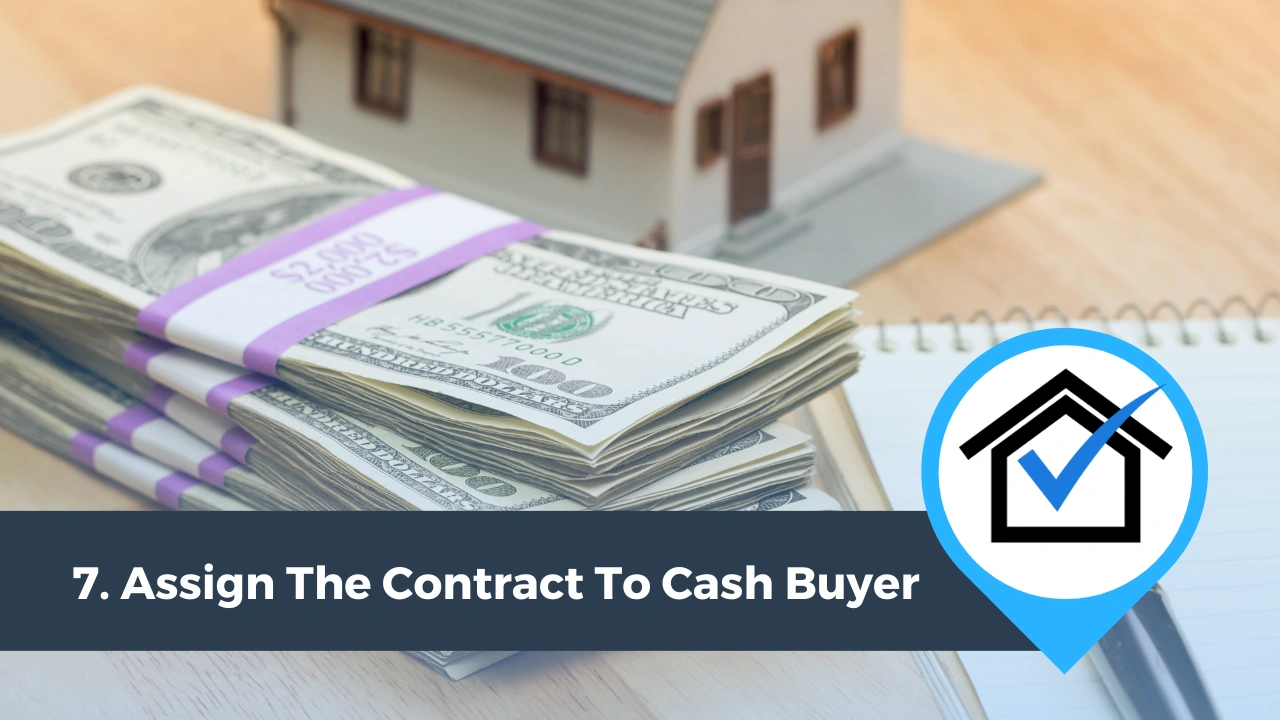How To Wholesale Real Estate In New Jersey: Step-By-Step (2026)
Jan 30, 2026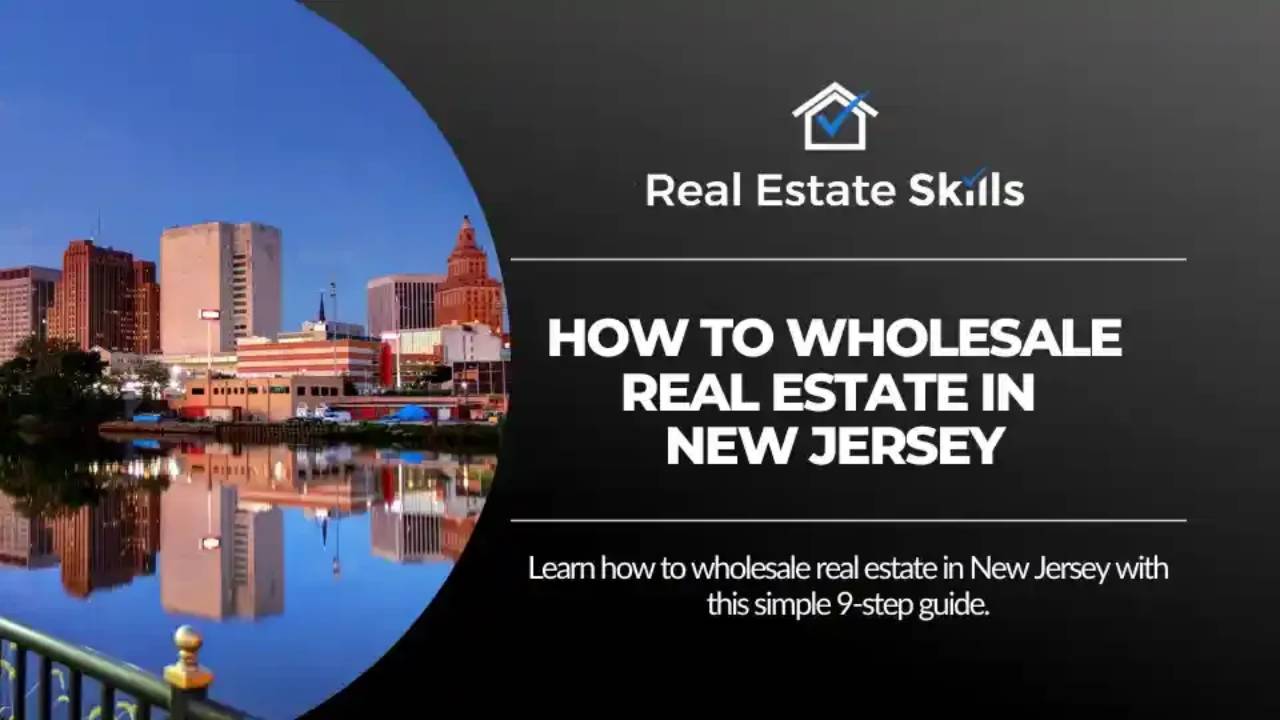
What: Wholesaling real estate in New Jersey involves identifying discounted properties, securing them under contract, and assigning the contract to a cash buyer for a profit—without owning or renovating the property yourself.
Why: Because it can be a lucrative investment strategy in New Jersey’s competitive real estate market. It allows investors to generate income quickly, build experience, and expand their network with minimal capital and risk.
How: Follow the steps in this article—learn New Jersey’s wholesaling laws, build a buyers list, find motivated sellers, analyze deals accurately, secure purchase agreements, and assign those contracts to cash buyers to execute a profitable wholesale transaction.
In this exclusive guide, we’re going to reveal one of the best strategies to capitalize on this great market opportunity. Let’s dive in and learn how to wholesale real estate in New Jersey:
- What Is Wholesaling Real Estate?
- How To Wholesale Real Estate In New Jersey (9 Steps)
- Is Wholesaling Real Estate Legal In New Jersey?
- How Much Do Real Estate Wholesalers Make In New Jersey?
- Wholesale Real Estate Contract New Jersey: What To Expect?
- Do You Need A License To Wholesale Real Estate In New Jersey?
- Is Wholesaling In New Jersey Easy?
- Final Thoughts On Wholesaling In New Jersey
If you’re serious about doing your first real estate deal, don’t waste time guessing what works. Our FREE Training walks you through how to consistently find deals, flip houses, and build passive income—without expensive marketing or trial and error.
This FREE Training gives you the same system our students use to start fast and scale smart. Watch it today—so you can stop wondering and start closing.
*Before we begin our guide on wholesaling real estate in New Jersey, we invite you to view our video on How To Wholesale Real Estate Step by Step (IN 21 DAYS OR LESS)!
Host and CEO of Real Estate Skills, Alex Martinez, provides a comprehensive, step-by-step guide for beginners to start wholesaling real estate!
What Is Wholesaling Real Estate?
Wholesaling real estate is simply a short-term real estate investing strategy that offers beginners and experienced investors the opportunity to invest in the real estate market with little capital due to limited cash flow needs. In simple terms, a real estate wholesaling transaction follows these simple steps:
- A wholesaler finds a discounted investment property priced below market value. This is usually a distressed property or one in which the owner has an urgent need to sell and will be likely willing to make a deal. These properties also tend to be difficult to market through traditional routes with a real estate broker or real estate agent, as they often need work to meet local building codes to be eligible for conventional mortgage financing.
- With an agreed-upon price, wholesalers execute a real estate contract with the seller. This fully executed contract of sale triggers a change in the property’s ownership due to the Doctrine of Equitable Conversion.
- The time that exists between the executed contract and the closing creates equity in limbo. At this time, the buyer receives the contractual right to buy the property; however, the current owner (or seller) maintains possession (and the right to enjoy the property) until the legal title passes at closing with a new deed.
- A wholesaler then looks for another buyer, usually another real estate professional, who intends to update or renovate the property to be sold to a retail homebuyer.
- The real estate wholesaler is awarded the right to purchase the subject property (aka, their equitable interest granted by the Doctrine of Equitable Conversion), which is the ONLY legal, marketable asset a wholesaler can sell/market without obtaining a real estate license in the Garden State.
- The sale and transfer of equitable rights to a new buyer is accomplished using an ‘assignment of contract.’ The wholesaler then assigns their equitable rights (their right to buy the property at a price and specific terms) to this new end buyer for a higher price or fee.
Read Also: How To Flip Houses In New Jersey
Why Wholesale Real Estate In New Jersey?
How To Wholesale Real Estate In (9 Steps)
Here's our simple step-by-step process for wholesaling real estate in New Jersey:
- Partner With A Wholesale Mentor
- Learn New Jersey Real Estate Wholesaling Laws & Contracts
- Understand The New Jersey Real Estate Market & Lingo
- Build A Cash Buyers List
- Find Motivated Sellers & Distressed Properties
- Put Distressed Properties Under Contract
- Assign The Contract To The Cash Buyer
- Close Deal And Collect Assignment Fee
- Double Close When Necessary

Step 1: Partner With A Wholesale Mentor
Mentoring can make a powerful difference in the professional life of a real estate wholesaler. Wholesale mentors offer an alternate path to specific knowledge and a great option for those who are unfamiliar with the real estate wholesaling process. They offer constructive and honest feedback, insight, and information. If you are new to wholesaling, consider that a mentor may provide you with:
- A sounding board for ideas and concerns.
- Professional advice.
- Encouragement.
- Networking opportunities.
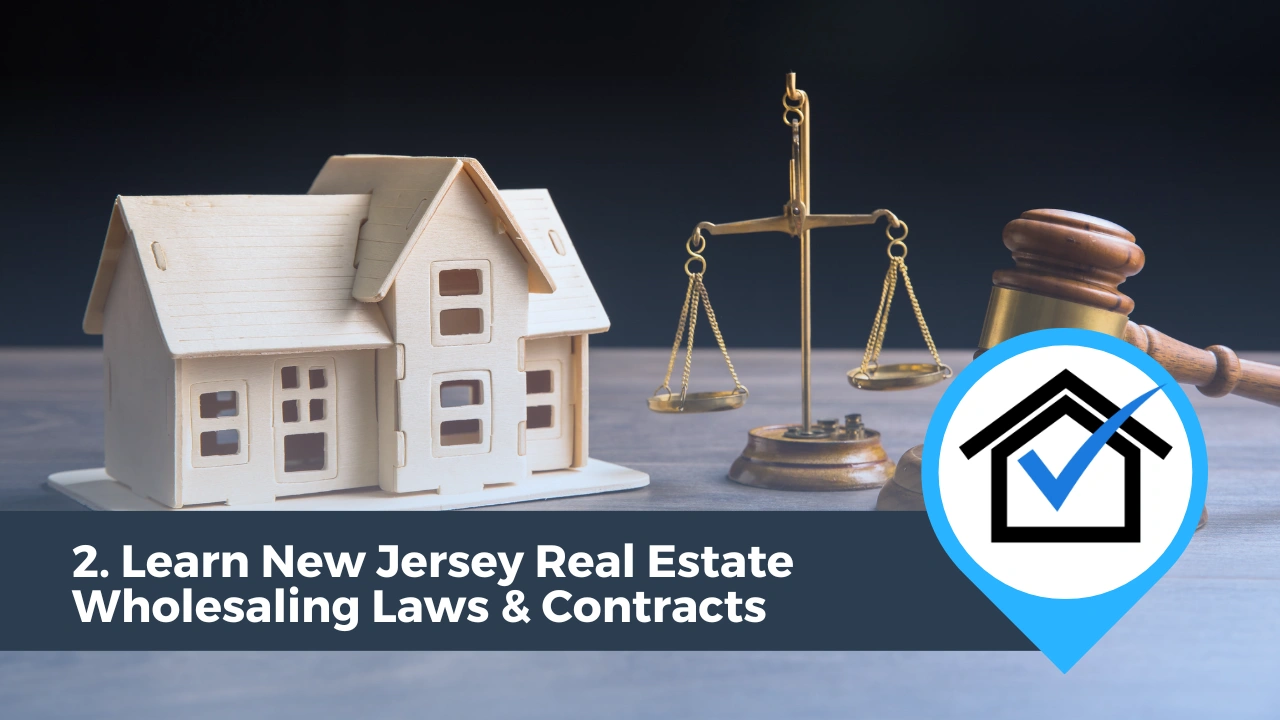
Step 2: Learn New Jersey Real Estate Wholesaling Laws & Contracts
The New Jersey Real Estate Commission (NJREC) operates within the state’s Department of Banking & Insurance. The Real Estate Commission was established in the 1920s as the state authority to administer and enforce New Jersey’s real estate and licensing laws.
Real estate licenses and activities in the state are administered and enforced by New Jersey Statutes Title 45, Ch. 15 – New Jersey Real Estate License Act
Wholesaling real estate in New Jersey offers investors the opportunity to work within the real estate industry without a need to obtain a license - if the wholesaler’s actions violate New Jersey state laws.
New Jersey law (RS 45:15-1) notes when a license is required.
New Jersey Statute 45§15-2 notes that it is possible to violate New Jersey’s license law with a single act. In other words, a violation does not need to be established by a pattern of engagement, just one transaction.
"Any single act, transaction or sale shall constitute engaging in business within the meaning of this article."
New Jersey 45§15-3 defines a real estate broker.
Provision NJRS 45§15-4 details potential exceptions to the provisions set forth by New Jersey’s Real Estate License Act.
New Jersey Is Not An Attorney Close State
Unlike many other states, New Jersey law has no defined requirement that a buyer or seller use a licensed real estate attorney to handle a real estate transaction. However, wholesalers with minimal experience are advised to consult with a real estate lawyer for those matters that are unfamiliar, as there are legal consequences for investment decisions with potentially significant consequences.
New Jersey Real Estate License Reciprocity
New Jersey offers no reciprocity for a real estate license with any state.
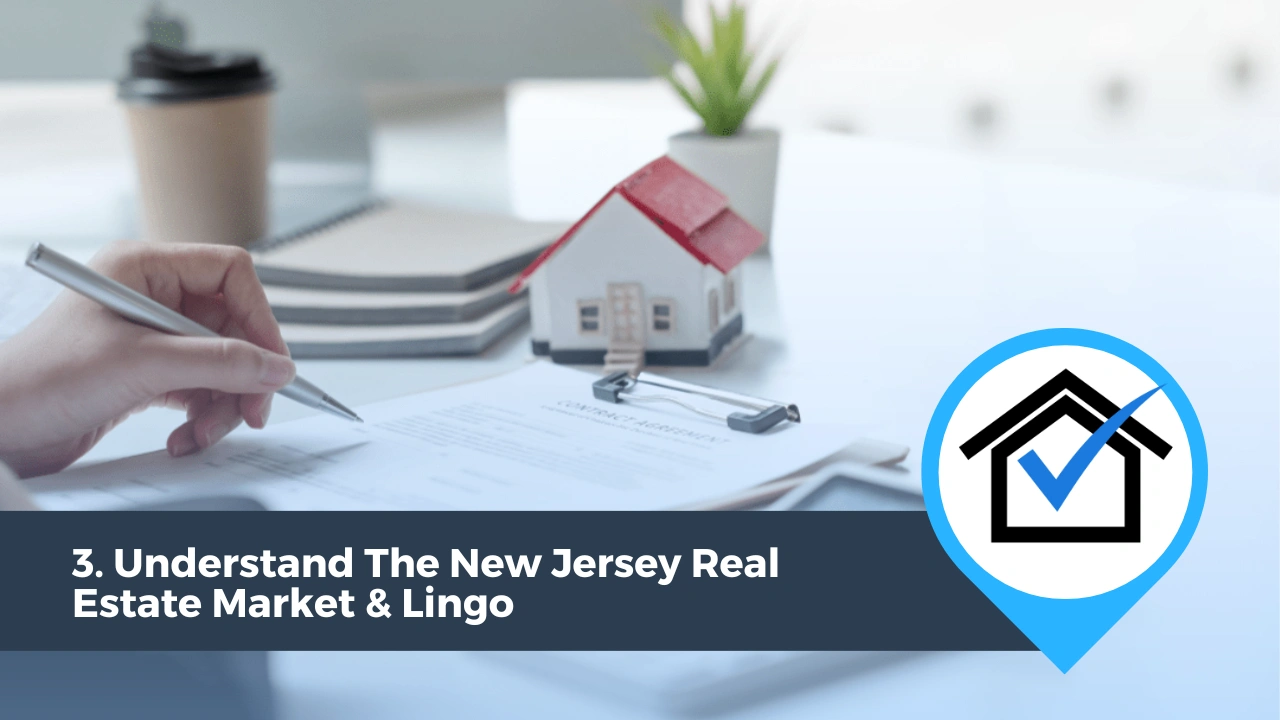
Step 3: Understand The New Jersey Real Estate Market & Lingo
The New Jersey REALTORS (NJR) is the state’s largest real estate trade organization. The NJR represents more than 63,000 members across the Garden State.
There are more than 14 local boards that are administered and organized under the state association. The realtor association in New Jersey is a potent voice in the protection of property rights and real estate professionals.
*Before we continue our guide, be sure to watch our video on the 10 BEST States To Wholesale Real Estate! Learn why New Jersey made our top 10 list!
Covering the entire span of the country, we delve into what sets each of these states apart, creating a perfect environment for both wholesalers and real estate investors.
Want more real estate videos? Be sure to visit our YouTube channel here!
When wholesaling in New Jersey, it’s essential to understand specific market indicators that shape property demand and profitability. Here’s a list of the most important indicators to watch:
-
Median Home Values – Median home values reveal the average price point in a market and help determine potential profit margins on wholesale deals.
-
Inventory Levels – Inventory, or the number of available homes for sale, indicates supply in the market; low inventory often creates high demand and faster turnover.
-
Days on Market (DOM) – This shows how quickly properties sell, which is crucial for wholesalers aiming for a quick close; shorter DOM suggests higher demand.
-
Market Appreciation Rates – Understanding appreciation trends helps predict future property value growth, informing whether to hold or quickly flip a property.
-
Rental Demand and Rates – Monitoring rental prices and vacancy rates can help wholesalers gauge investor interest, especially in areas with strong buy-and-hold potential.
-
Foreclosure Rates – High foreclosure rates may present more opportunities for discounted properties but can also signal economic challenges in the area.
-
Unemployment Rates – High unemployment can impact housing stability and buying power, affecting both property values and buyer demand.
-
Economic Growth and Job Market – A strong job market and economic growth in areas like New Jersey’s urban centers attract buyers and investors, boosting real estate demand.
-
Interest Rates – Interest rates directly influence buyers' purchasing power, which affects demand for properties; lower rates can spur higher demand and quicker sales.
-
Population Growth and Demographic Shifts – Population trends reveal if people are moving to or leaving an area, which impacts long-term housing demand and the viability of wholesaling in that market.
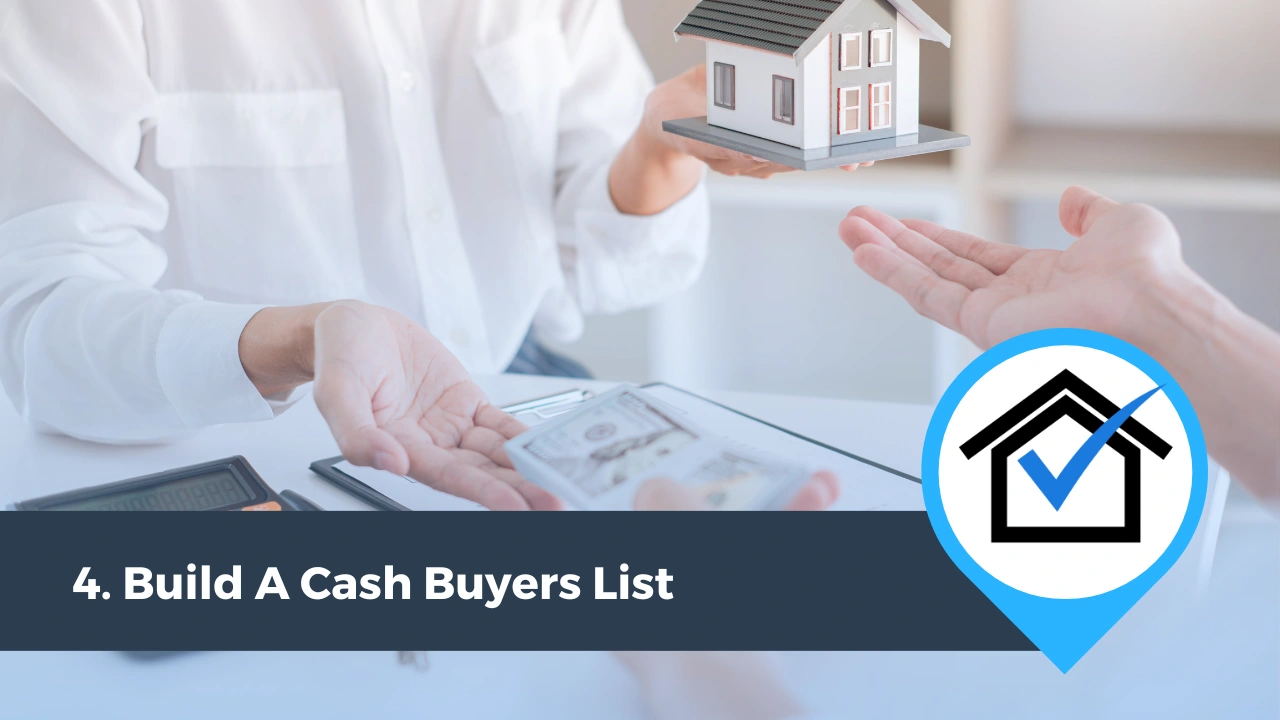
Step 4: Build A Cash Buyers List
The importance for a New Jersey wholesaler to build a cash buyers list cannot be overstated.
You can also check out this video on how to find cash buyers!
Fortunately, there are many ways to locate individuals and professionals who have an interest in potential wholesale real estate deals.
The various ways to build a cash buyers list include –
- Bandit Signs that are placed strategically in areas of interest.
- Social Media (Craigslist, etc.), podcasts, and related meetups.
- REIA Local Meetings.
- Checking with real estate attorneys or property managers.
- Simple website marketing. Note that it is a smart idea to have a website as a wholesaler, as this builds credibility.

Step 5: Find Motivated Sellers & Distressed Properties
A real estate wholesaler’s objective is to find a property that is selling below its relative market value. Real estate that is priced below its true value is usually in need of repairs, or the homeowners are hugely motivated to sell – for personal reasons. Distressed properties are available from motivated sellers who want to sell an owner-occupied unit or a rental property.
Potential wholesale on and off-market properties can be located in many ways, especially in the digital real estate market. Homes listed (and even expired listings) are a great way to get a feel for the market as well as find a home with a price tag worthy of a wholesale deal. Sites like Redfin and Zillow have enormous amounts of data to search.
Don’t forget about the tried-and-true search methods. Many wholesalers find opportunities on a lender’s foreclosure or Real Estate Owned (REO) lists.
Read Also: Finding Motivated Seller Leads: Free & Paid Tactics
Step 6: Put Distressed Properties Under Contract
Wholesaling houses requires investors to locate properties that are being offered at a price that meets investment benchmarks or criteria. To keep the wholesale process running smoothly, wholesalers ideally will manage a few wholesale deals at various stages in the wholesale process.
When searching for a property – and before signing a legally enforceable wholesale real estate contract, real estate wholesalers must understand a property’s basics – including its current price and its potential sales price with anticipated renovations and property updates.
Wholesalers and other investors (like fix and flip professionals) usually apply two fundamental metrics to determine if a property is a worthwhile wholesale investment –
- The 70% Rule states that an investor should pay no more than 70% of the After Repair Value (ARV). The ARV is defined as the property’s anticipated market value – after an investor completes updates and renovations.
- The Maximum Allowable Offer (MAO) considers the out-of-pocket and closing costs plus repair expenses to create a turnkey property. If repairs are required, the MAO will always be less than the projected After-Repair Value.
Before you determine your MAO, let's look at how to lock in that property.
Watch this video to learn how to confidently fill out real estate contracts and secure your deal.
Here is an example:
A wholesaler is offered a property to purchase for $225,000. This price is considerably below its true market value because the property needs some routine updates that should cost approximately $65,000. When renovated and updated, this subject property will have a value of $450,000.
How would a wholesaler approach this real estate transaction?
A wholesaler needs to determine the Maximum Allowable Offer – or the highest offer a typical wholesale buyer would pay. This is calculated below.
- First, calculate 70% of the After Repair Value: $450,000 * 0.7 = $315,000
- Next, compute the Maximum Allowable Offer by subtracting the anticipated expenses of $65,000 from $315,000. The Maximum Allowable Offer for a buyer of this wholesale deal would be willing to pay, at most, $250,000 [$325,000 - $65000].
- As a result, a real estate wholesaler in New Jersey could expect to earn upwards of $25,000. [$250,000 (MAO) - $225,000 (Original Contract Price)]
Read Also: How To Find Off-Market Properties In New Jersey: The 4 Best Sources
Step 7: Assign The Contract To Cash Buyer
A real estate investor wholesaling in New Jersey, after signing a purchase and sale agreement with the seller, can assign their ‘right to purchase’ to another buyer (usually a fix and flipper)– prior to the first closing.
Most wholesalers prefer to assign their equitable rights to the new buyer before the first contract even closes. This is the preferred closing or existing strategy because it reduces the cost to close and the time from contract to profit.
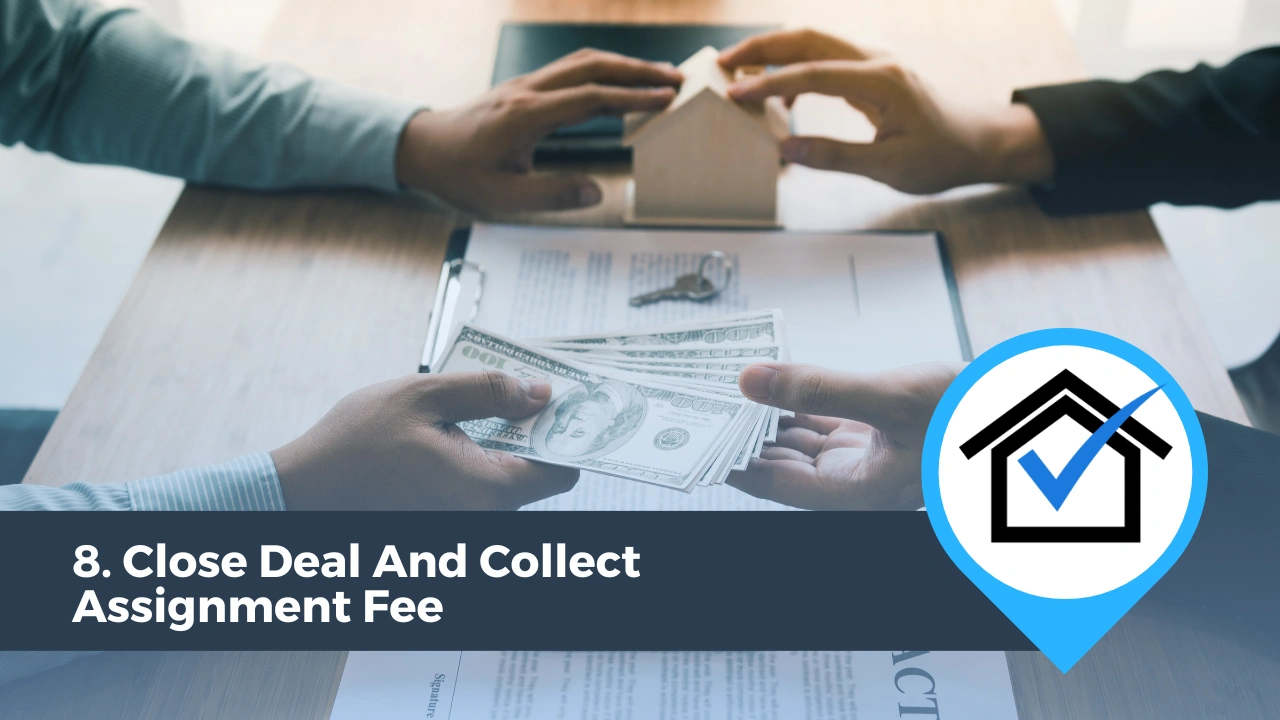
Step 8: Close Deal And Collect Assignment Fee
When the Assignment of Contract has been executed, the new end buyer becomes the rightful purchaser of the subject property at the terms stipulated in the original purchase agreement.
Depending on how the wholesaler structures the deal, an assignment fee may be collected from the new buyer at the time of assignment, at closing, or after closing.
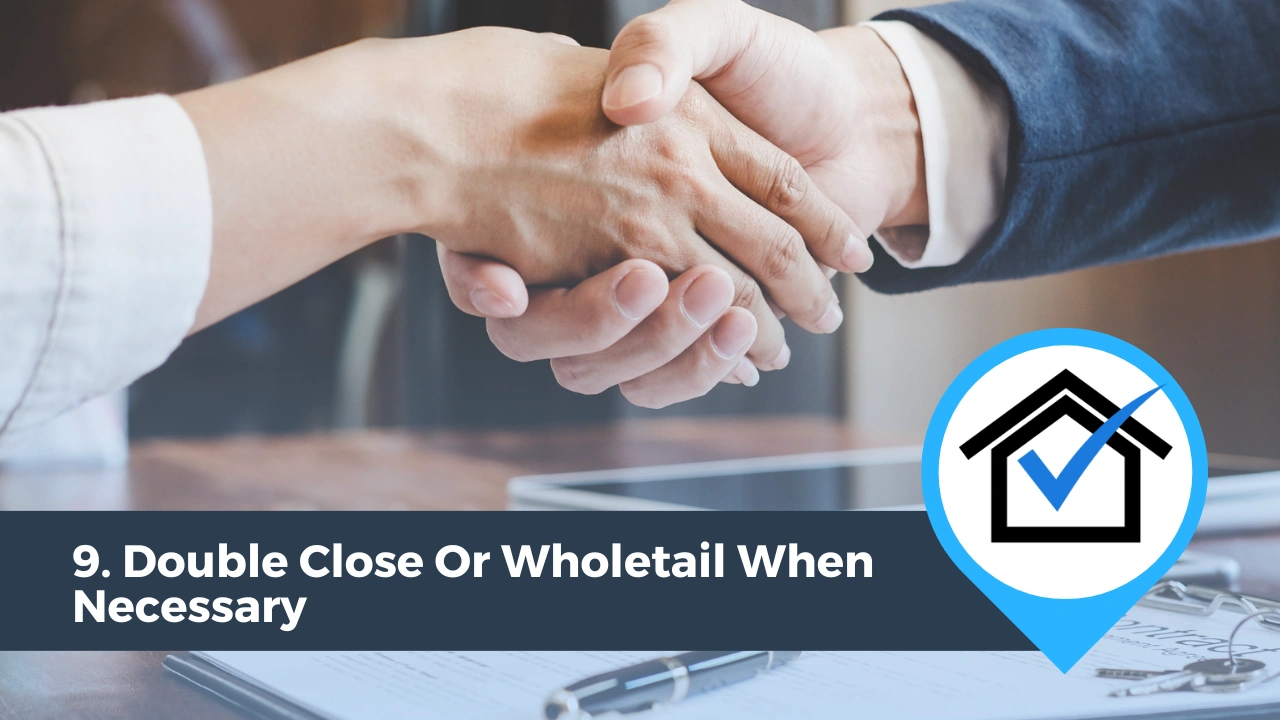
Step 9: Double Close When Necessary
There are times when a wholesaler in New Jersey may have to close on the first original contract before they can assign the contract to a new end buyer due to an unexpected delay in the process. Should this happen, a New Jersey wholesaler can use the Double Closing exit strategy.
There are several fundamental differences between a double close and an assignment exit strategy.
For some investors, the Double Close exit strategy is preferred because this technique allows them not disclose the amount of their profit (to either the new buyer or the seller). In addition, the second transaction’s sale would need no license because the wholesaler is the property seller.
However, note that the double closing exit strategy requires the wholesaler to have the capital required to close, even if temporarily. For those who need to borrow this capital, there are hard money lenders and transactional funding providers with programs to meet this need.
Is Wholesaling Real Estate Legal In New Jersey?
Real estate wholesaling is legal in New Jersey if wholesalers in the Garden State can operate within the state’s real estate license laws.
However, it's important to note that real estate law in New Jersey (RS 45:15-1) requires a real estate license under certain circumstances:
"45:15-1. No person shall engage either directly or indirectly in the business of a real estate broker, broker-salesperson, or salesperson, temporarily or otherwise, and no person shall advertise or represent himself as being authorized to act as a real estate broker, broker-salesperson, or salesperson, or to engage in any of the activities described in R.S.45:15-3, without being licensed so to do as hereinafter provided."
Amended 1953, c.229, s.1; 1993, c.51, s.1; 2009, c.238, s.1; 2018, c.71, s.1.
How Much Do Real Estate Wholesalers Make In New Jersey?
One of the benefits of working as a professional real estate wholesaler is that potential earnings have no income limits.
While wholesaling and working as a licensed real estate broker in New Jersey are clearly not the same job, both occupations are related to real estate and sales.
According to the federal Occupational Outlook Handbook, the median annual income (41-9021 & 41-9022) for real estate brokers and real estate agents was $48,770, which translates to $23.34 each hour.
The number of real estate professionals in New Jersey includes around 220 real estate brokers and over 1,800 real estate sales agents.
Wholesale Real Estate Contract New Jersey: What To Expect?
Real property ownership in New Jersey is transferred by a deed at closing. However, until closing, it is the real estate contract that governs the transaction and the purchase of the subject property. New Jersey’s Statewide standard real estate purchase agreement requires a comprehensive amount of information that includes -
- The New Jersey property’s address plus its legal description.
- An earnest money deposit is typically a small percentage of the purchase price. An earnest money deposit (EMD) is provided as an act of good faith.
- Any of the seller’s personal items are to be included in the real estate transaction.
- The purchase price and financing terms, among others.
New Jersey Real Estate Contracts Are Not Assignable by Default
In New Jersey, the standard Realtor's contract of sale is NOT assignable—unless the seller provides consent to the buyer in writing. On page 12 of the New Jersey contract is Item 37 – The No Assignment Clause.
However, any buyer who obtains the seller’s consent, as required, will find that real estate wholesaling is completely legal in New Jersey. The seller’s written consent may be documented through a simple assignment addendum signed by all parties.
Do You Need A License To Wholesale Real Estate In New Jersey?
No, you do not need a license to wholesale New Jersey real estate. Wholesaling houses in New Jersey is legal if the wholesaler stays within state law.
Remember that a wholesaler without a New Jersey real estate license can only market/sell their equitable right to purchase the property, NOT the property itself.
In addition, a wholesaler in New Jersey should follow these suggested wholesaling business philosophies:
- The wholesaling professional should act with integrity.
- The wholesaler should be transparent regarding their intent to all parties involved while managing the seller’s expectations.
Is Wholesaling In New Jersey Easy?
Wholesaling real estate offers investors an entrance ramp into a market with only minimal capital and, most importantly, a short-term strategy that reduces inherent risk.
And while some beginners find traction out of the gate, most wholesalers seek out help from those who have mastered the art of wholesaling in New Jersey. The knowledge of experienced wholesalers and professional investors can be accessed by enrolling in the Pro Wholesaler VIP Program.
The Pro Wholesaler VIP Program is designed for the modern entrepreneur to learn the basics and nuances of the trade and how to avoid the pitfalls typically found by new real estate wholesalers. It is 100% online and is used for local and virtual real estate wholesaling.
Final Thoughts On Wholesaling In New Jersey
Real estate wholesaling in New Jersey, in addition to flipping houses, has become a popular investment strategy over the past decade. The most important issues to remember about wholesaling in New Jersey are as follows:
- A wholesaler cannot violate license laws
- A standard New Jersey Contract of Sale includes a clause that requires written consent from the seller to assign the contract
Wholesaling houses in New Jersey can be quite profitable if done smartly, with transparency and integrity.
With the right training and mentorship, you can be ready to start scaling your wholesale real estate business. Check out our brand new free training on how we help investors all across the country, wholesale houses or wholesale homes, and flip houses from the MLS using only a laptop and a cell phone.
If you’re serious about doing your first real estate deal, don’t waste time guessing what works. Our FREE Training walks you through how to consistently find deals, flip houses, and build passive income—without expensive marketing or trial and error.
This FREE Training gives you the same system our students use to start fast and scale smart. Watch it today—so you can stop wondering and start closing.
*Disclosure: Real Estate Skills is not a law firm, and the information contained here does not constitute legal advice. You should consult with an attorney before making any legal conclusions. The information presented here is educational in nature. All investments involve risks, and the past performance of an investment, industry, sector, and/or market does not guarantee future returns or results. Investors are responsible for any investment decision they make. Such decisions should be based on an evaluation of their financial situation, investment objectives, risk tolerance, and liquidity needs.

